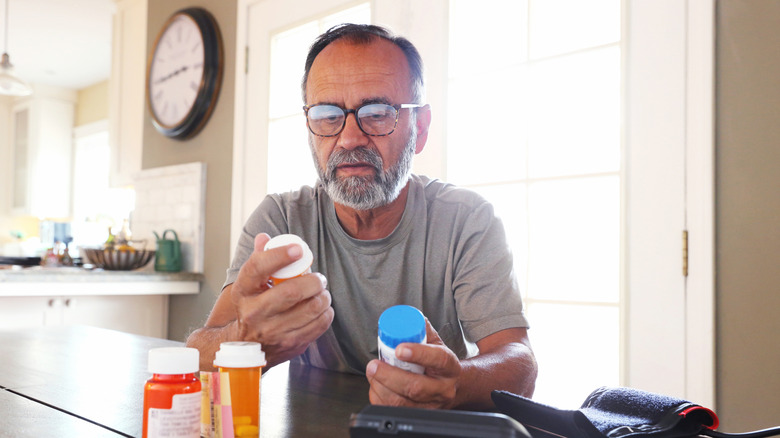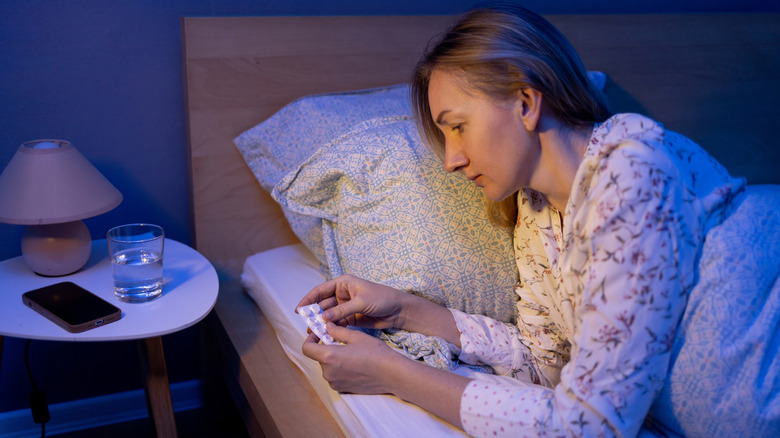
Everyone experiences sleep problems occasionally. Some causes are predictable, such as adjusting your sleep routine after a trip. Other sleepless nights can be unexpected, adding to the frustration of identifying the reason for your wakefulness. On such nights, having a sleep aid in your medicine cabinet can be helpful to catch some extra sleep.
However, it’s important not to depend on sleep aids nightly, particularly if you’re using anticholinergic medications like doxylamine (Unisom). Anticholinergic drugs treat a variety of conditions, such as allergies, overactive bladder, and depression, by blocking acetylcholine, a neurotransmitter involved in cognition and muscle movement, depending on the receptors it affects.
Doxylamine is a first-generation antihistamine commonly used for seasonal allergies. This class of antihistamines can affect multiple brain receptors, leading to anticholinergic side effects like drowsiness. A 2015 study in JAMA Internal Medicine found that long-term, high use of anticholinergic medications can increase the risk of dementia by 54%.
Long-term use of doxylamine may be linked to dementia

The study observed over 3,000 individuals aged 65 and older, with follow-ups every two years. Researchers recorded the participants’ anticholinergic medication dosages over the previous decade. Doxylamine and diphenhydramine (Benadryl) were among 17 different antihistamines tracked, along with eight other types of anticholinergic drugs. The most frequently used anticholinergic medications were antihistamines, antidepressants, and overactive bladder treatments.
Doxylamine wasn’t among the top three medications used, so the study couldn’t establish a direct link between it and dementia. Nevertheless, researchers noted that using the bladder control drug oxybutynin or the tricyclic antidepressant doxepin for three years correlated with a heightened risk of dementia. Doxepin is also sometimes prescribed for insomnia.
Although it’s unclear if taking doxylamine alone increases dementia risk, it may be wise to monitor your use of these antihistamines (histamine type 1 receptor antagonists) as you age. A 2022 study in Frontiers in Aging Neuroscience found no overall dementia risk in people over 50 who took these medications. However, data showed that individuals over 65 had a 78% higher risk of dementia compared to non-users, particularly in men and those with other health conditions.
Find out what’s causing your sleeplessness

If you frequently struggle with falling asleep, it may be beneficial to consult a doctor or sleep specialist to check for sleep disorders. According to a 2025 article in GeroScience, individuals with sleep disorders have an elevated risk of developing dementia. Obstructive sleep apnea increases the risk of dementia by 33% and Alzheimer’s disease by 45%. Insomnia raises the risk of dementia by 36%, Alzheimer’s by 49%, and vascular dementia by 59%.
If you occasionally use Unisom, it may be helpful to identify potential triggers and consider keeping a sleep diary. While a glass of wine or beer might help you relax, the Sleep Foundation indicates that even a small amount of alcohol before bed can disrupt sleep. Just one drink for women or two for men can reduce sleep quality by up to 24%.
A latte may help you through a late afternoon slump, but caffeine can persist in your system into the evening. The Sleep Foundation recommends cutting off caffeine around 2 p.m. Exercising earlier in the day can also enhance sleep quality at night. Even a short outdoor walk can expose you to natural sunlight, aiding in regulating your body’s internal clock. Here are some other strategies to improve sleep.
To help reset your internal clock, you might try melatonin, but other natural sleep aids like valerian, L-theanine, and glycine might also be beneficial. Just ensure any supplement doesn’t interact with your current medications.
“`




